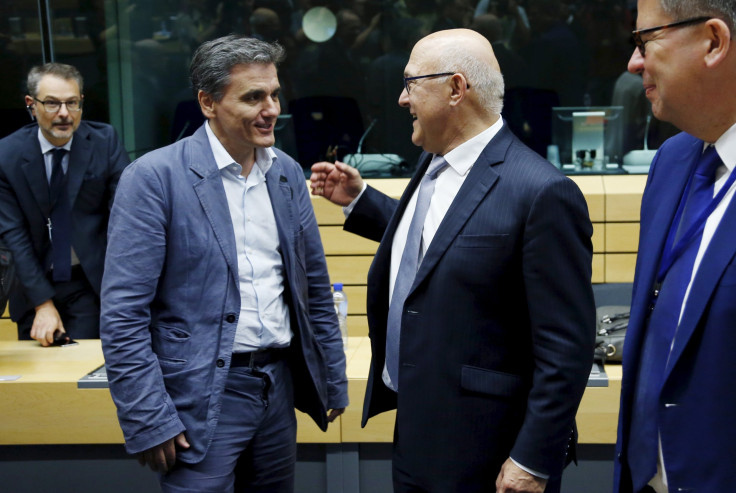Greek Debt Crisis: Bailout Deal Talks Suspended, To Resume Sunday

European finance ministers working on a bailout plan for Greece suspended talks in Brussels late Saturday without approving a plan, Agence France-Presse reported. Talks were to resume at 11 a.m. Sunday, the Guardian reported.
#BREAKING Eurozone finance ministers suspend Greece talks, to meet again Sunday: Finland
— Agence France-Presse (@AFP) July 11, 2015#eurogroup over at midnight. till 11 tomorrow. no statement agreed for summit. yet
— Ian Traynor (@traynorbrussels) July 11, 2015After the meeting Jerosn Dijsselbloem, head of the Eurogroup, said the difficult discussions had made some headway. "We have had an in-depth discussion of the Greek proposals. The issue of credibility and trust was discussed, and also of course the financial issues involved," he said, according to the Guardian. "It is still very difficult, but work is still in progress."
Greece's parliament approved a bailout proposal Friday that was strikingly similar to the one its country's citizens voted to reject -- with the backing of Prime Minister Alexis Tsipras -- about a week ago. The plan included spending cuts and tax increases for Greece to recieve about 54 billion euros in a three-year deal, Reuters reported. As talks progressed Saturday, European finance ministers worked to draft a new, tougher alternative plan than the one approved by Athens. Two sources told Reuters the 18 ministers present demanded Greece take further steps to assure it would honor any new debts. The new measures perhaps would include product and labor market reform, the BBC reported. The finance ministers meeting in Brussels reportedly were working toward drafting a statement that could call for Greece to begin legislating reforms as early as this week, AFP reported.
EU official says #Greece needs to do more on product and labour market reform. And needs to pass more laws this wk to show they're serious.
— Chris Morris (@BBCChrisMorris) July 11, 2015Eurogroup working for statement committing Greece to legislate for reforms as soon as next wk, but lot to do, 2 or 3 hrs more - diplomats
— Danny Kemp (@dannyctkemp) July 11, 2015One of the biggest stumbling blocks to approval of a proposal could be Finland, media reports indicated. If Finland refuses to vote for an aid plan, there reportedly is an emergency measure that would allow a plan to pass with 85 percent approval.
Finland does not want to back a bailout plan for Greece, which would be the country's third since 2010, the Telegraph and Finnish business publication Kauppalehti reported. As it stands there needs to be unanimous approval for a proposal to go through, but a European Stability Mechanism emergency measure allows for 85 percent majority approval and Finland holds just a 1.7 percent voting share, Sky News reported. Yet after the meeting had concluded, Finland's Alexander Stubb said talks were "making good progress," Reuters reported.
RTRS - EUROGROUP "MAKING GOOD PROGRESS" ON GREECE -FINLAND'S STUBB
— Eric Burroughs (@ericbeebo) July 11, 2015It is confirmed: Finnish gov't won't accept a new bailout package to #Greece. #Eurogroup
— Jarno Hartikainen (@JarnoHa) July 11, 2015Thanks to an obscure legal clause, ESM can agree a bailout with 85% of votes, not unanimity. These are voting rights: pic.twitter.com/Yfqp8T60Jn
— Ed Conway (@EdConwaySky) July 11, 2015Stubb announced the recess on Twitter after nine hours at the negotiating table, saying, "End of Eurogroup session. To be continued tomorrow (Sunday)."
Finland's state broadcaster YLE reported the Finnish government told its Parliament's Grand Committee Saturday it did not consider the Greek proposal sufficient to start negotiations for a new bailout.
Meanwhile, the situation in Greece was growing more dire as the country faces an uncertain future if markets reopen Monday without a bailout plan in place and the country perhaps out of the euro. Greece would need about 25 billion euros just to recapitalize its banks and capital controls -- limits on cash withdrawals and transfers -- could last two more months, Reuters reported.
The country's poorest have been hit especially hard, with food beginning to grow more scarce, the New York Times reported. People lined up outside banks to withdrawal their daily allowance of cash, and by some accounts queues for food, clothing and medicine have grown five times longer in the last two weeks. European Commission President Jean-Claude Juncker told the Times the EU was developing humanitarian aid plans for Greece should the third bailout plan not be worked out this weekend.
© Copyright IBTimes 2024. All rights reserved.





















